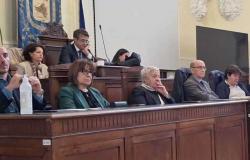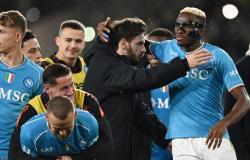Venice, Teatro La Fenice, Opera and Ballet, Season 2023-2024
“MEPHISTOPHELE”
Opera in a prologue, four acts and an epilogue. Libretto and music by Arrigo Boitofrom the verse drama “Faust” by Johann Wolfgang von Goethe
Mephistopheles ALEX ESPOSITO
Faust PIERO PRETTI
Margherita pizza MARIA AGRESTA
Marta/Pantalis KAMELIA KADER
Elena MARIA TERESA LEVA
Wagner/Nereus ENRICO CASARI
Orchestra and Choir of the Teatro La Fenice
Director Nicola Luisotti
Choir Master Alfonso Caiani
Little Venetian Singers
Choir Master Diana D’Alessio
Direction Moshe Leiser And Patrice Caurier
Scenes Moshe Leiser
Costumes Agostino Cavalca
Light designer Christophe Forey
Video designer Étienne Guiol
Choreography Beate Vollack
New La Fenice Theater Foundation setup
Venice, 12 April 2024
“We are the children of sick fathers: / eagles at the time of changing their feathers, / we flutter mute, astonished, hungry, / on the agony of a god. […] // Chaste poet whom Italy adores, / old man absorbed in holy visions, / you can die!… It is the hour of the antichrists! / Christ is dead again!”: yesThere are two stanzas of the poem Prelude – manifesto of the Milanese scapigliatura -, where Emilio Praga denounces the crisis of valueswhich struck the generation following the romantic-Risorgimento season, announcing the advent of the Antichrists, the new desecrating intellectuals. Among them, a prominent position belongs to the young Arrigo Boito, who he served among the Milanese “scapigliati”, taking on their attitudes nonconformists. It dates back to 1862 The Sapphic Ode with glass in handperformed bythe poet twenty-one year old, during a dinner, to toastking “Cheers to Italian Art! / So that you can escape for a moment / From the circle of the old and the idiot, / Young and healthy. […] / Perhaps someone has already been born above the altar / Who will raise art, modest and pure, / On that ugly altar, like a brothel wall”. Published in a periodical, aroused the resentful reaction of Verdi: “If I, among the others, have dirtied the altar, as Boito says, he will clean it, and I will be the first to come and light a candle”, he wrote to Tito Ricordi. Animated by this vis controversy the author conceived the Mephistopheles: nand a work was bornui generiswhose libretto – with inserts of “barbaric” meter – And characterizesto by a subversive, desecrating and innovative charge, as well as by a background of Masonic and Gnostic origin, which glorifies the Apocalypse of the Antichrist, announced by the seven thunders and the seven trumpets of the Prologue in Heaven. By renewing the layout and style of the libretto, Boito meanEve free the melodrama with the canonical division into pieces closed, to reach, even crossing the traditional rhythmic and harmonic boundaries, a renewal of musical theatre. The first Mephistopheles (1868) was a monumental provocation of more than five hours with which the fighter disheveled intended to challenge the public. The 5 March 1968, at the Teatro alla Scala, Boito was booed, but returned the whistlettabulls with the same coin, through his alter ego, Mephistopheles, who in the Song “of the whistle”, he hit them with his hissing nihilism, after admitting in the Prologue in Heaven “the risk / of getting some boos”. This first, unfortunate version was then subjected to following revisioni – from the one successfully represented in the “Wagnerian” Bologna (1875) to the one proposed in Milan (1881) – giving rise to the opera we all know, in which Faust, originally a baritone, becomes tenor, while the duration is halved, following substantial cuts. A work dtollto such a troubled genesis represents
a challenge for every director. They were aware of it Moshe Leiser And Patrice Cauriercreating the staging of Boitian’s masterpiece – returning to the Fenice after fifty-five years of absence -, in which Myselffistheles, the main character, it’s thealter ego of the authorwho shares it Lor contemptuous nihilism. A nihilism, which is translated visually, at the beginning of the show (Prologo in Cheaven), on an almost empty stage, apart from an armchair on which the protagonist sitssee, then turning on the television, but – supreme irony! – the faulty remote control allows him to watch only one network, CattoTVnot exactly to his liking. It is a non-place, an abandoned theatre, where nothing is represented. Furthermore, even the subsequent scenes – the garden, the carnival, the two sabbats – do not represent real places, but rather hallucinations caused in Faust from the drug, which Mephistopheles injects him during the stipulation of the demonic pact, at the end of Easter Sunday, dominated by a noisy football match. There Sgarden dinnerin particular, takes place in the squalid open space of one Bier Stube, while the Shellish abba and how in other setups – a wild and sinister party. Original the Sclassic abbaThank you
to the expedient of the theater within the theatre, with Elena primadonna next to a piano without a pianist. The symbolism of theEpilogueWhere Faust awaits death by playing the cello, a look for in music the extreme consolation. They contribute to the effectiveness of the show even the scenes of Leiser himself, the lighting of Christophe Foreythe costumes Of Agostino Cavalca, the projections of Etienne Guiol and the choreographies of Beate Vollack. As for the musical direction Nicola Luisotti, supported by a sensitive and involved orchestra, it offered a reading based on a wide dynamic and agogic range, as required by a score, in which there is no shortage of contrasts, accommodating the directorial choices as well as the needs of the singers, who are all capable of also deal with notable orchestral sounds. Between the vocal interpretersstar of the evening was Alex Esposito – recently appreciated at the Fenice in the Contes d’Hoffmann
in opening the current Slyrical style – confirming himself as a reference interpreter in diabolical roles. Also like Mefistofele he combined a notable stage presence with excellent vocal and interpretative skills: brilliance of timbre, power of emission, clarity of phrasing, theintense expressiveness. He was also honored Piero Pretti, who with a similarly powerful and timbred voice offered a Faust calm even in gesture, shining in lyrical expansions. A little subdued in the prison scene (mild dAndfaillance in “The other night at the bottom of the mare”) appeared Maria Agrestawhich however outlined an overall credible Margherita. They offered excellent performances Maria Teresa Leva (Elena), Kamelia Kader (Marta/Pantalis) ed Enrico Casari (Wagner/Nereus). Both are excellent Corre: that Phoenician, led by Alfonso Caiani and the Piccoli Cantori Veneziani instructed by Diana d’Alessio. Enthusiastic spersonal success for Alex Esposito.
Tags: Venice Teatro Fenice Mefistofele GBOPERA





